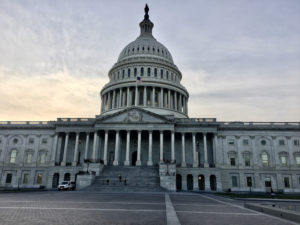
The Supreme Court rules tribal police can stop non-Indian persons in certain contexts, DHS ends a program against asylum seekers, and more…
IN THE NEWS
- The U.S. Supreme Court unanimously held that a tribal police officer may search and temporarily detain non-Indian persons if they are suspected of violating federal or state law while traveling through a reservation on public roads. The lower court had reasoned that the tribal officer did not have authority to stop the defendant because he had not determined if the defendant was Indian nor did the officer witness the defendant committing a crime. The lower court’s determination was informed by past precedent holding that tribes lack the authority to exercise criminal jurisdiction over non-Indians. Based on an exception articulated in Montana v. United States, however, the Supreme Court reversed the lower court and held that a tribe has “inherent sovereign authority” over any activity on a reservation that impacts the welfare of the tribe.
- U.S. Department of Homeland Security Secretary Alejandro Mayorkas issued a memo ending the Trump-era migrant protection protocols program, which returned approximately 68,000 asylum seekers to Mexico since its inception in 2019. President Joseph R. Biden previously issued an executive order to suspend the program and directed Mayorkas to assess whether to terminate or modify the program. In his review, Mayorkas found that the migrant protection program did not “adequately or sustainably enhance border management.” Mayorkas noted that the program’s termination is consistent with the Biden Administration’s broader goal to improve legal migration processes.
- The U.S. Department of the Interior announced a suspension of oil and gas drilling leases in the Arctic National Wildlife Refuge pending an environmental review. The Bureau of Land Management first issued the leases in early January 2021 under the Trump Administration. In response to an executive order issued by President Biden, the Interior Department reviewed the leases and found issues with the underlying record supporting the lease sales. Secretary of the Interior Deb Haaland subsequently directed the Interior Department to examine the leases for legal deficiencies, including deficiencies related to environmental review under the National Environmental Policy Act.
- China announced a change in policy to begin allowing couples to have three children. The Chinese government also announced additional policy changes to encourage families to have children, including establishing a universal childcare system and improving the affordability of housing. The policy changes came in the wake of recently released census data showing that China’s population growth over the last decade was at its slowest since the 1950s. China announced in 2016 that couples could have two children, altering its widely known one-child policy.
- California Attorney General Rob Bonta asked the U.S. Environmental Protection Agency (EPA) to restore California’s ability to create its own greenhouse gas emission standards for vehicles. Under the Trump Administration, EPA revoked a waiver that allowed California to issue its own greenhouse gas vehicle standards. Under President Biden, EPA recently proposed to reinstate the waiver. Alice Henderson, senior attorney for the Environmental Defense Fund, testified at EPA’s public hearing that the restoration of the waiver “is an important step toward reducing the air pollution burden that disproportionately impacts low-income communities and communities of color.”
- The U.S. Senate unanimously approved a bill to save the Commodity Futures Trading Commission’s (CFTC) whistleblower program. The whistleblower program provides protections and financial awards to individuals who report violations of the Commodity Exchange Act. The program was in danger of collapse because the CFTC is required to pay over $100 million to a Deutsche Bank whistleblower, which could deplete the whistleblower program’s fund. If enacted, the bill would establish a $10 million temporary fund to keep the program running in the event the program’s account is exhausted before it can be replenished. Senator Chuck Grassley (R-Iowa), the bill’s author, urged the U.S. House of Representatives to take action to save the CFTC’s whistleblower program, citing the program’s past success as a tool for the identification of fraud and other crimes.
- The U.S. Department of Education revised a Trump Administration policy governing state and federal regulators’ access to information related to federal student loans. The Education Department’s federal student aid chief operating officer Richard Cordray wrote in a blog post that the previous policy required loan servicers working with the Federal Student Aid office of the Education Department to get approval from the Education Department before fulfilling state officials’ requests for information. This policy prevented states from obtaining student loan information because the Education Department often denied officials’ requests. Cordray also wrote that the revised guidance will streamline these approval requests and make it easier for state officials to access information needed to protect student loan borrowers.
- The U.S. Department of Agriculture announced that most farmers who planted cover crops during this crop year are now eligible for an insurance premium reimbursement of five dollars per acre as part of its pandemic cover crop program. Cover crops, such as cereals and grasses, prevent soil erosion and increase nutrient capacity. The new premium benefit is intended to mitigate the financial burden of cultivating cover crops, which COVID-19 market disruptions worsened. Furthermore, the premium benefit encourages farmers to cultivate cover crops as a conservation practice.
WHAT WE’RE READING THIS WEEK
- In a recent National Bureau of Economic Research working paper, Rahi Abouk, professor at William Paterson University, and his coauthors studied the effects of state recreational marijuana laws on the ability of people aged 40-62 to work productively. Abouk and his coauthors found a decrease in the number of workers’ compensation claims and a decrease in income from workers’ compensation benefits in states that legalized recreational marijuana use. Abouk and his coauthors theorized that the reductions in claims and income from workers’ compensation benefits may be the result of people’s increased ability to work productively due to access to marijuana, which can act as an alternative method of pain management.
- In an analysis for the Cato Institute, Chris Edwards, director of Cato’s tax policy studies, argued that state and local policymakers should stimulate economic growth after COVID-19 by eliminating regulatory barriers for startup businesses. Edwards noted that, despite a rebound in summer of 2020, business startups have trended downward long-term. The downward trend is a problem, Edwards argued, because startups typically create the most net jobs for the United States’ economy. Edwards proposed that state governments should combat this trend by eliminating laws that require new entrants in certain industries to obtain approval from regulatory agencies, reviewing licensing rules under cost-benefit analyses, and cutting regulations that raise labor costs. Edwards also suggested that local governments should improve bureaucratic processes and reduce licensing and permitting roadblocks.
- In an essay for the Brookings Institution, Mark MacCarthy argued that existing antitrust laws do not adequately limit a technology company’s discretion over its digital infrastructure services, such as app stores. MacCarthy suggested that existing barriers reduce the possible effectiveness of currently available antitrust remedies. For example, MacCarthy explained that companies, such as Apple or Google, can circumvent court-mandated price caps by charging app developers different rates for different levels of app store service and quality. As a result, MacCarthy argued that creating a digital regulatory agency, which would oversee app infrastructure, could provide needed protections to developers and consumers.
FLASHBACK FRIDAY
- In an essay in The Regulatory Review, Aaron Jordan, now senior counsel for the U.S. House Committee on Foreign Affairs, argued for proper incentives for whistleblowers to come forward to expose white-collar crimes. Jordan cited a 2008 study showing that whistleblower tips were responsible for exposing over half of all public company fraud schemes. Jordan explained that those working inside organizations are often in the best position to report wrongdoing. Jordan concluded that, although the U.S. Securities and Exchange Commission, the CFTC, and the Internal Revenue Service have implemented whistleblower incentive programs, regulators in other areas, such as wildlife crime, should also provide greater incentives for individuals to come forward.



